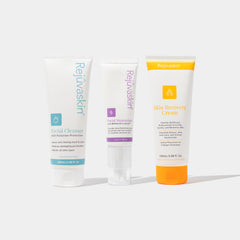When you have eczema, even choosing a moisturizer can feel like navigating a minefield. Many skincare products—even those labeled for sensitive skin—contain ingredients that can actually worsen eczema symptoms. For anyone with atopic dermatitis, understanding what ingredients to avoid is an essential step toward calming inflammation, preventing flare-ups, and protecting the skin barrier.
Although it’s always wise to consult a dermatologist, science has made it clear: some ingredients are far more likely to trigger irritation than others. Below, we’ve compiled a list of common skincare ingredients shown to irritate or sensitize eczema-prone skin, backed by peer-reviewed research.
1. Propylene Glycol
Why avoid it?
Used as a solvent and humectant in many creams and serums, propylene glycol is known to irritate damaged or sensitive skin, especially in those with compromised barriers like eczema patients. While it can help hydrate in small doses, it is also a well-known irritant and contact allergen (Watkins, 2009), (Nasir & Gaspari, 1996).
2. Fragrance (Including “Natural” Fragrances)
Why avoid it?
Fragrance is one of the most common cosmetic allergens. Up to 40% of allergic reactions from personal care products are attributed to fragrances (Darsow et al., 1997). Even essential oils labeled as "natural" (like citrus, lavender, or rose oil) can provoke flare-ups.
Tip: Look for products labeled “fragrance-free”, not just “unscented”—unscented products may still contain masking fragrances.
3. Essential Oils
Why avoid it?
While popular in natural skincare, essential oils are potent botanical compounds that can act as allergens. Oils such as tea tree, peppermint, vanilla, and sweet almond oil have been linked to skin sensitivity and may exacerbate eczema when applied to inflamed skin.
4. Urea
Why avoid it?
Urea is a keratolytic agent, meaning it softens thick, dry skin—helpful in conditions like psoriasis. However, it can also sting and irritate raw or inflamed eczema patches, especially at high concentrations. Clinical evidence suggests urea may disrupt skin barrier function in atopic individuals and cause discomfort (Watkins, 2009).
5. Lanolin
Why avoid it?
Lanolin is derived from sheep’s wool and is frequently used for its moisturizing effects. Unfortunately, lanolin is also a known allergen, particularly among people with sensitive or eczema-prone skin. Studies suggest it is often sensitizing when applied to damaged or inflamed areas, as is common in eczema (Heine et al., 2006).
6. Retinoids
Why avoid it?
Retinoids are vitamin A derivatives widely praised for anti-aging benefits—but they are potent skin exfoliants that can cause dryness, redness, and flaking, especially in sensitive or already-inflamed skin. While some people with eczema can tolerate low concentrations under medical supervision, they should be used with extreme caution.
What to Look for Instead
When shopping for eczema-safe skincare, opt for products that are:
-
Fragrance-free
-
Formulated with ceramides, hyaluronic acid, and niacinamide
-
Gentle and pH-balanced
-
Endorsed by the National Eczema Association (NEA)
At Rejûvaskin, we formulate every product with transparency and intention. Our Skin Recovery Cream is designed specifically for compromised skin, using ingredients like calendula, aloe, hyaluronic acid, and peptides—and never any of the irritants listed above.
Always Read the Label
Eczema can be frustrating, but your skincare doesn’t have to be. Take time to read ingredient labels, look for NEA-approved products, and consult your dermatologist when in doubt. Your skin deserves care that soothes—not irritates.
You can always count on Rejûvaskin to be clear and honest about what’s in our products—and what’s not.
Works Cited (APA Style)
-
Darsow, U., Abeck, D., & Ring, J. (1997). Allergy and atopic eczema: on the value of the "atopy patch test". Der Hautarzt, 48(8), 528-535.
-
Watkins, J. (2009). Pruritis part 1: Atopic eczema. Practice Nursing, 20(11), 561–566.





















Leave a comment